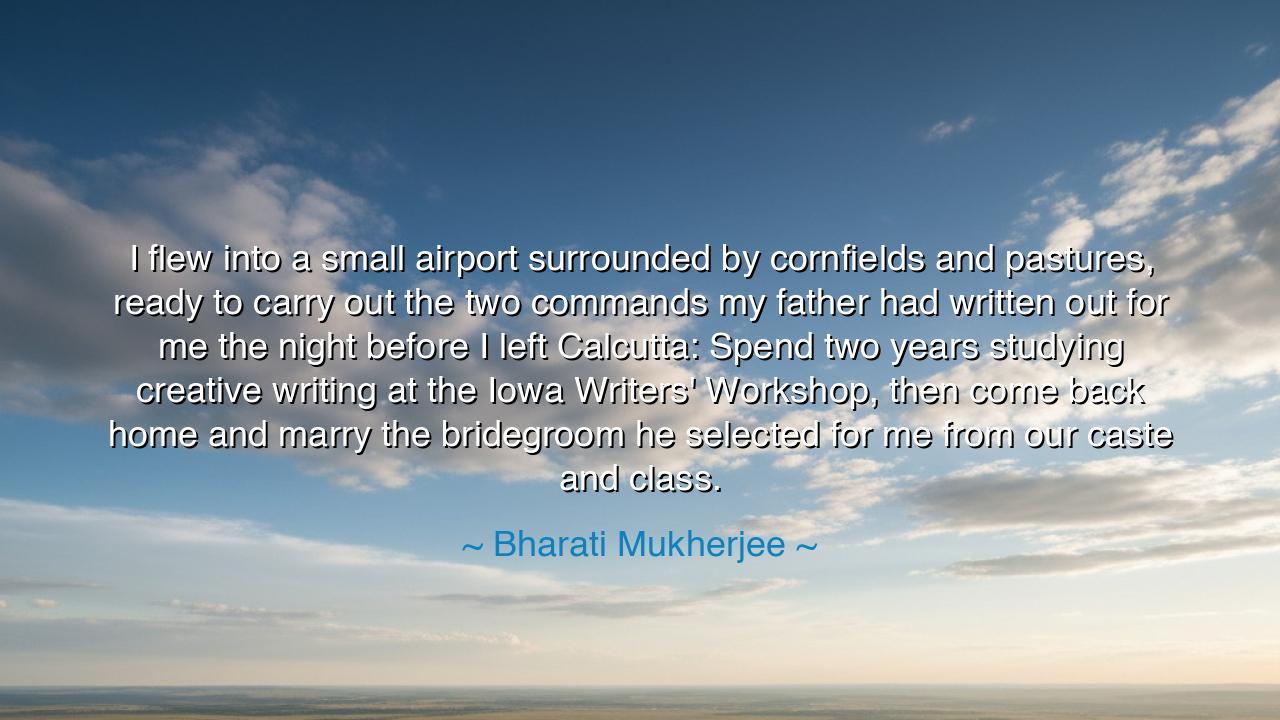
I flew into a small airport surrounded by cornfields and
I flew into a small airport surrounded by cornfields and pastures, ready to carry out the two commands my father had written out for me the night before I left Calcutta: Spend two years studying creative writing at the Iowa Writers' Workshop, then come back home and marry the bridegroom he selected for me from our caste and class.






In the hush of a Midwestern dawn, a young traveler descends into a small airport “surrounded by cornfields and pastures,” carrying not only luggage but a pair of engraved edicts: “Spend two years studying creative writing at the Iowa Writers’ Workshop, then come back home and marry the bridegroom he selected for me from our caste and class.” So speaks Bharati Mukherjee, and in her words we hear the ancient quarrel between duty and desire, between the father’s commands and the daughter’s unwritten future. The quote is a gate set in two worlds: the rustling fields of Iowa and the crowded courtyards of Calcutta, the reverent grammar of caste and class and the unruly music of creative writing. It is a scene of arrival that is also a test: whose script will she perform, and whose story will she author?
The meaning coils within the contrast. A ticket carries her across oceans, but a text—those two commands—seeks to carry her back. The Iowa Writers’ Workshop is offered like a pilgrimage with a return date already stamped; the classroom is permitted as a vestibule to the altar of an arranged marriage. To study craft is allowed; to claim a life is not. In such a decree lies the soft iron of tradition: generous enough to educate, stern enough to reclaim. The fields around the runway whisper possibility; the letter in her pocket whispers obedience.
Yet the origin of this moment is not merely familial; it is historical. Calcutta—with its storied libraries and ferocious genealogies—sends a daughter into America’s interior, into a republic of sentences where authorship is a sacrament. The cornfields are not merely scenery; they are symbols of a culture where the individual may plant a seed without first asking the village to bless the furrow. The two years are meant to be a parenthesis, but they widen as she reads, writes, and meets minds that do not ask her to kneel before caste or class. In this crossing, the airplane is a chariot, the workshop a forge, and the passport a page that begs to be inscribed.
From this crucible arose the life we now know: Bharati Mukherjee chose the vocation of authorship and the vocation of choosing itself. She would marry for love, collaborate and converse with fellow writers, and become a luminous chronicler of migration, identity, and reinvention. The daughter who landed under a father’s commands became the woman who examined the commands societies place upon women and strangers. Her novels and essays track that audacity: that borders can be crossed, that caste can be questioned, that the “bridegroom selected for me” can yield to the partner selected by me. The small airport opens onto a continent; the narrow directive opens onto an era.
Set beside her story another from the ledger of courage, to magnify the lesson. In the late nineteenth century, Pandita Ramabai stepped out from the strictures of high-caste expectation, crossing seas for study and returning to found schools for widows and girls. She, too, carried letters of instruction from an old order, and she, too, learned to read past them. Different centuries, different vehicles—steamship and jetliner—but the same hinge: the moment a woman treats commands as propositions and tradition as material to be worked, not a wall to be worshiped. The point is not rebellion for its own sake; it is agency for the sake of truth.
What, then, shall we teach our children from this cornfield threshold? That the gifts of our elders—language, lineage, love—need not be refused in order to be reinterpreted. That a mandate is not a destiny. That creative writing is more than craft; it is the training of a will that can revise the paragraphs others place around your life. When the page of expectation says, “Return,” and the page of vocation says, “Continue,” wisdom holds both pages in the same light and chooses the sentence that tells the truer story.
Take these actions as traveling provisions. (1) Write your own two commands—one from the world that formed you, one from the life that calls you—and compare them honestly. (2) Keep a daily page where you examine which voice guided each decision: caste/class or conscience. (3) Seek a circle—teachers, peers, elders—who honor your lineage yet refuse to let it imprison you. (4) Make one choice this month that is yours alone, and name it without apology. (5) When you gain space, open it for another—edit a page, sponsor a visa, recommend a manuscript—so the field widens beyond your footsteps. Do these, and the small airport will become a wide horizon; the commands will become counsel; and the life you live will read, at last, like something only you could have written.






AAdministratorAdministrator
Welcome, honored guests. Please leave a comment, we will respond soon